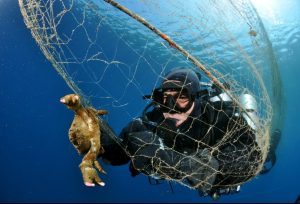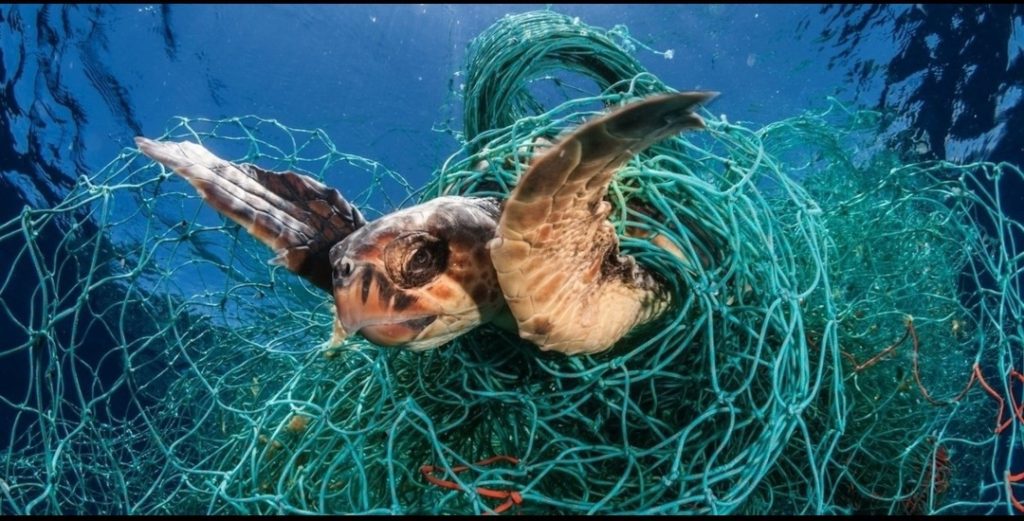“Ghost fishing” may likely be an unfamiliar term to many but it simply refer to a nondeliberate or passive act of fishing by derelict fishing gear or otherwise called “ghost gear”.
A Derelict fishing gear is a discarded, abandoned, or lost, fishing gear in the ocean or any marine environment.
When this type of gear continues to fish and trap aquatic lives, entangle and potentially kill marine life, and act as a hazard to navigation it is called ghost fishing.
A Derelict fishing gear, may include tools such as: fishing nets, traps, pots, etc is one of the main types of numerous debris that affect large natural water body today.
With several partnerships by marine life preservation associations and agencies, a measure of solution is provided to fishermen to dispose off old, derelict or unusable fishing gear safely.
This aims at reducing the amount of derelict fishing gear in and around coastal waterways.
These bodies also charge and support new, innovative prevention and safer strategies through technological advancements in fishing gear.
As a proof and an encouragement that these strategies from the collaboration of same goal agencies are truly offering solutions to help prevent derelict fishing gear.
In the U.S, over 1,814,369.48 kilograms (4 million pounds) of gear from 56 locations have been collected.
Causes of Ghost Fishing
Ghost fishing is caused by unintentional but abandoned fishing gears abandoned in marine space resulting in many unwanted circumstances.
But of course, these gears do not cause these problems on their own accord. Humans aid these directly and indirectly.
Some fishing equipment is lost to storms, currents and other natural issues that may trigger abandonment of gears.
The next cause of ghost fishing occurs as a result of poor maintenance of fishing gears by sea explorers and fishermen.
They may own worn out gears, or bad nets etc which may disappear when anchors, floats or moorings corrode or even during fishing.
Most usually, a greater percentage of ghost fishing gear loss happens when crews throw gears overboard because it seemed simpler and quite expedient way to dispose of it.
Impacts of Ghost Fishing

There is most usually a cost and effect for what we do and inspite ghost fishing being indeliberate) there are several identified consequences of ghost fishing.
In 2019, more organized regional workshops were created and staged on best practices to prevent and reduce abandoned, lost or derelict fishgear to mitigate the problem.
Estimation of derelict and ghost fishing gears may likely be scattered across thousands of kilometers through seas or trapped by obstacles on sea beds.
Ghost fishing apparently affects the quantity of available fish, both edible ones and beautiful untamed aquatic life that forms the beauty of the ocean.
It really does affect different fishes stock from a numerical point of view.
Fish or any other aquatic life caught in ghost gear cannot be harvested by fishers and they become depleted catches because they are trapped in these nets and they may inevitably die, if they can’t break free.
Their carcasses may decay, disintegrate and pollute surrounding water.
They also become sources and hosts for waterborne diseases that in turn will negatively affect the health of other species in the area.
Ghost gears contribute to navigational hazards. They could get roped to some part of a boat or similar means of transportation and therefore cause hull damage,
How Much Fishing Gear is Lost?
It is nearly impossible to determine the exact number but World Animal Protection (WAP) an estimated 25,000 nets are discarded annually in the Northeast Atlantic alone.
These numerical value is not static and hence increases every year.
Sometimes diving teams embark on retrieving these abandoned and lost gears.
Some nets weigh about 10,000 pounds, and diving teams may have to take multiple trips underwater.
For such nets, only about 300 pounds can be retrieved per single dive trip out of the ocean.
The search is tasking and may be dangerous too for divers.
Conclusion
Ghost fishing is an unwanted act and it places aquatic animals at risks. It is important that fishermen, and other forms of sea explorers show more care in how they discard their gears.
Just as it matters, that more and information about this should be disseminated to as many coastal areas as can be.
